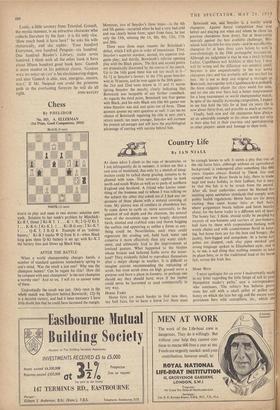HORSE FAIRS
Horse fairs are much harder to find now than, say bull fairs, for to have a horse fair there must
be enough horses to sell. It seems a pity that one of the old horse fairs, although without an agricultural background, is endangered after something like 600 years. Gipsies always flocked to Thirsk fair and camped near the River Swale in July, there to trade nags and make holiday in their fashion, but it' may be that this fair is to be struck from the record. After all, local authorities cannot -be blamed for insisting upon sanitation standards that comply with public health regulations. Horse fairs are far more exciting than mere honey fairs or hull faiis, where gargantuan beasts bellow and lurch heavily about, for the horse trader is a different sort of man. The honey fair, I think, should really be peopled by wearers of sun-bonnets and carriers of pan-baskets, bull fairs by those with corporations beslung with watch chains and with countenances florid in keep- ing, but horse fairs are for the lean and hungry, the jaunty, bow-legged and outspoken. At a horse fair palms are slapped, rank clay pipes smoked and strong language spoken in Elizabethan style, and it is, to me, a sad thing that nothing remains to take its place here, or in the traditional land of the horse fair, across the Irish Sea.






























 Previous page
Previous page